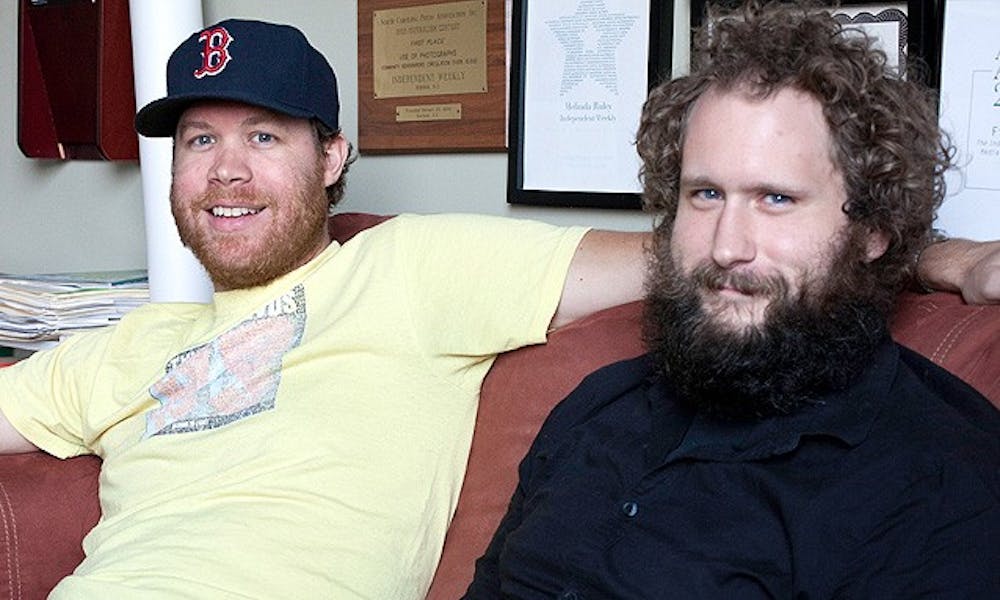As recently as two years ago, the second weekend in September didn’t hold any particular significance to Raleigh-Durham music fans.
That’s changed, in a big way: now in its second edition, Hopscotch Festival will take over downtown Raleigh next weekend, with a lineup of over 150 bands spread over thirteen different venues. Headliners include psych-rock legends the Flaming Lips and venerated ‘90s alternative outfit Guided By Voices, among others, playing at City Plaza, the recently opened centerpiece of downtown Raleigh.
By any measure, it’s one of the biggest music festivals in the southeastern United States. So how did it get here?
In the summer of 2009, an ad executive named Greg Lowenhagen at the Independent Weekly, the largest and longest-running alternatively weekly newspaper in the Raleigh-Durham area, sensed a vacuum in the otherwise vibrant local music scene. Lowenhagen, a graduate of the University of North Carolina, had recently relocated after stints living in Chicago and Austin, Texas, home to some of the biggest music festivals in the nation: Lollapalooza, in Chicago’s Grant Park, and Austin’s city-wide SxSW and Austin City Limits. So he went to Independent Weekly owner Steve Schewel with a pitch: a large-scale urban music festival, held by the paper, befitting the Research Triangle’s stature as a hotbed of musical talent.
“I was thinking about places I’d already lived, and the venues and heritage and reputation of music in the Triangle,” Lowenhagen said. “I was surprised there wasn’t anything in place already.”
Oddly enough, the financial crisis of the previous year helped his cause. Between the general economic downturn and the ongoing difficulties facing the newspaper industry, Lowenhagen’s idea wasn’t a tough sell.
“With the [economic] climate at the time, a lot of the people in the alt-weekly business were looking to diversify their brand,” Lowenhagen said.
That included Schewel, who had been doing research of his own to try to find new revenue streams for the paper and recognized the potential for a high-profile local festival.
“The Independent has such a great music franchise, and our music writing is so popular,” Schewel said. “It certainly seemed like a natural fit.”
Enter Grayson Currin, the Independent Weekly’s music editor, who went to work alongside Lowenhagen to put together the festival that became Hopscotch: finding and inviting bands, booking venues, putting together a volunteer staff and publicizing the event. The pair are the only paid, full-time employees of the festival—officially, Lowenhagen is the director, and Currin, the curator. Without assistance from outside promotion companies, the two have total creative and administrative control. It’s a unique management structure among music festivals, which are increasingly run by festival organizers like Superfly, which puts on both the Manchester, Tennessee mega-fest Bonnaroo and Asheville, NC’s Moogfest.
“We can be very hands on and decide exactly what’s happening,” Currin said. “Some days, it’s exhausting, but it allows us to micromanage in a good way.”
Without an extensive and costly organizing apparutus, Hopscotch also has a particular advantage—relatively cheap tickets.
“An overwhelming majority of our budget is spent on talent,” Currin said, “and that turns around to a pretty low ticket price.”
As a result, the festival’s aesthetic bears a heavy resemblance to its creators’ tastes. It’s a carefully constructed blend—of national and local acts, of emerging and established bands, of a range of different genres and mentalities. Currin cites a number of contrasts in the lineup: black-metal innovators like Liturgy next to the performance art of the Flaming Lips, the Southern-fried speed-rap of Yelawolf next to revered Dinosaur Jr. frontman J. Mascis.
“Hopscotch as a whole sounds a lot like my brain, and Greg’s brain,” Currin said. “The goal is to present music that’s as interesting and compelling as possible.”
And even though last year’s edition ended up in the red, organizers are optimistic about the festival’s financial outlook, both for the Independent Weekly and for the Raleigh area. Hopscotch has already sold out their 3500 three-day, all-inclusive passes, and Lowenhagen estimated that more than 15,000 will attend some portion of the festival.
“The money we lost last year, we knew we’d lose it,” Schewel said. “I viewed it as an investment, and I feel certain we’ll make money this year.”
Currin emphasized that, despite the scope of the festival and plans to expand it in the future, Hopscotch will remain a distinctly local event.
“Next year might be even better, and take the festival to another level,” Currin said. “But we’ll only do it in a way that’s comfortable and that fits with Raleigh.”
What the next level might be remains an unknown. But considering Hopscotch’s rapid ascent to artistic and commercial viability, the future looks pretty bright.
Hopscotch Festival runs from Sept. 8 through Sept. 10 at multiple locations in downtown Raleigh. Select tickets are available at http://hopscotchmusicfest.com
Get The Chronicle straight to your inbox
Signup for our weekly newsletter. Cancel at any time.

